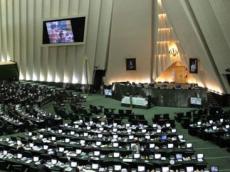|
|
TODAY.AZ / World news
Iran considers switching from "presidential system" to "parliamentary system", MPs' opinions vary
01 August 2012 [15:20] - TODAY.AZ
 MPs in Iranian parliament vary in opinions, as the country is considering switching from "presidential system" to "parliamentary system", Etemad newspaper reported.
MPs in Iranian parliament vary in opinions, as the country is considering switching from "presidential system" to "parliamentary system", Etemad newspaper reported.Iranian Supreme Leader Ayatollah Ali Khamenei's hint last year that the "presidential system" might give way to a parliamentary system has sparked an intensive debate about the merits of such a shift.
After Khamenei's remarks, the idea of switching from "presidential" to "parliamentary" system has become central.
Replacement of the presidential system with a more European-style parliamentary system would mean scrapping the office of president and a resurrection of the role of prime minister in a revised system based on parliamentary consensus.
Defenders of the proposal point to often tense relations between the Majlis (parliament) and the executive branch headed by President Mahmoud Ahmadinejad and say the change would bring about closer parliamentary scrutiny of the government.
Iran's parliamenary speaker Ali Larijani embraced the idea of the switch, claiming that this would result in a more smooth and efficient form of government.
On the other hand, former Iranian president Ali Akbar Rafsanjani, who heads the Expediency Council, has opposed this idea, as well as the related notion that the council, which serves as a quasi-parliamentary group, should also be scrapped.
Etemad newspaper reported that a special faction within the Iranian parliament has been created, that would look into the issue of switching from "presidential" system to the "parliamentary" one.
Thus far, the names of those in the faction have not been made public.
The newspaper said the faction has already been discussing the candidates for both Prime Minister and President.
The chairman of Iranian parliament's Planning and Budget Commission Shahbaz Hassanpour Ali said that the faction has discussed the possible duties and responsibilities of the prime minister and president, the newspaper said.
The parliament has a serious intention of reviewing the parliamentary system, before making any concrete steps, and after the necesarry negotiations are over, the results will be revealed, said the newspaper.
Before, Iran already did have the "parliamentary system" in the country in the late 80s.
If the "parliamentary system" in Iran is accepted, the Prime Minister will be elected by the parliament.
Member of Iranian parliament's Energy Commission Muayyid Hosseini al-Sadr said "there are no appropriate grounds yet available for implementing the project".
He added that it is better to wait until the election law is decided upon, and later to examine the parliamentary system in depth.
For several months already, the Expediency Council has been discussing the possible changes in the country's electoral law.
A few weeks ago, several conservatives expressed views on if the changes to the electoral law applied, there should also be changes made to the process of elections in the country.
The conservatives expressed an idea that the elections would be handled by an independent entity, instead of country's government.
/Trend/
URL: http://www.today.az/news/regions/110823.html
 Print version
Print version
Views: 1573
Connect with us. Get latest news and updates.
See Also
- 25 August 2025 [22:23]
LG Chem expands its portfolio for more sustainable future - 25 August 2025 [21:50]
Ethnic Kazakhs return to Kazakhstan since its independence - 25 August 2025 [21:20]
Telegram users can now add music to their profile - 25 August 2025 [20:13]
Trapped in past: how Persian nationalists bankrupt Iran's future - 25 August 2025 [19:48]
European Post suspend shipments to United States - 25 August 2025 [13:56]
Ukraine’s endgame: Zelensky, Zaluzhny, and battle for public trust - 25 August 2025 [09:00]
Israeli army chief pressures Netanyahu to accept prisoner swap deal - 24 August 2025 [08:00]
Washington plans to provide 20 tons of plutonium for civilian nuclear use - 23 August 2025 [21:50]
Marmara region records driest July in 65 years - 23 August 2025 [21:20]
TikTok to cut hundreds of jobs in UK amid AI moderation shift
Most Popular
 World Bank approves Istanbul’s efforts to tackle natural hazards
World Bank approves Istanbul’s efforts to tackle natural hazards
 Elon Musk invited Mark Zuckerberg to join $97 bln bid for OpenAI, court filing reveals
Elon Musk invited Mark Zuckerberg to join $97 bln bid for OpenAI, court filing reveals
 Caspian neighbors unite: President Aliyev’s visit marks stronger ties
Caspian neighbors unite: President Aliyev’s visit marks stronger ties
 Footage of President Ilham Aliyev’s visit to Turkmenistan posted on his social media [VIDEO]
Footage of President Ilham Aliyev’s visit to Turkmenistan posted on his social media [VIDEO]
 Uzbekistan considers purchasing ships from Azerbaijan and Turkmenistan
Uzbekistan considers purchasing ships from Azerbaijan and Turkmenistan
 US and S Korean FMs coordinate ahead of Trump–Lee Summit
US and S Korean FMs coordinate ahead of Trump–Lee Summit
 Valentina Matviyenko sends congratulatory letter to First VP Mehriban Aliyeva
Valentina Matviyenko sends congratulatory letter to First VP Mehriban Aliyeva
